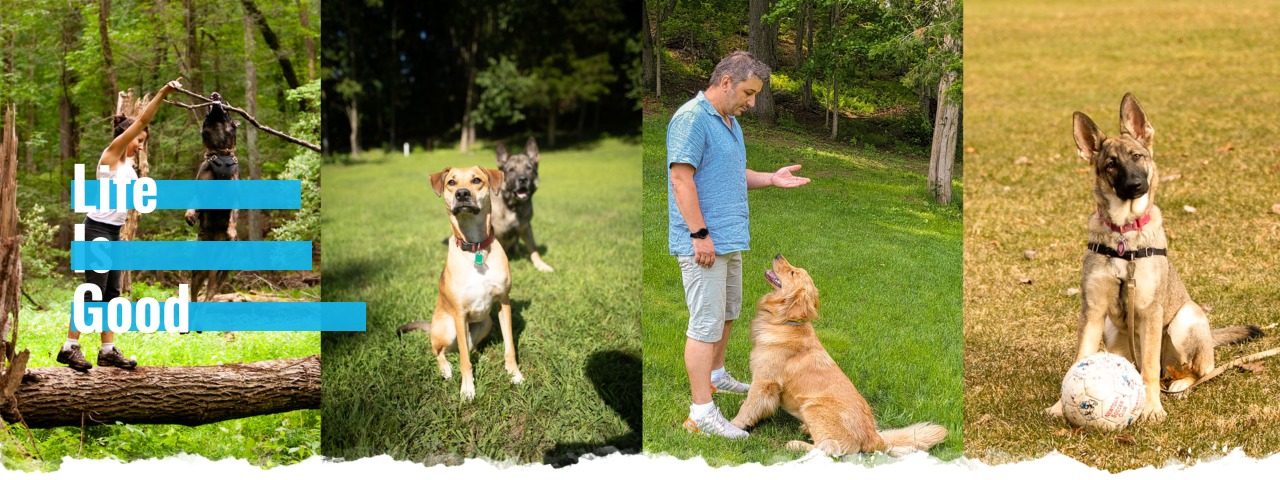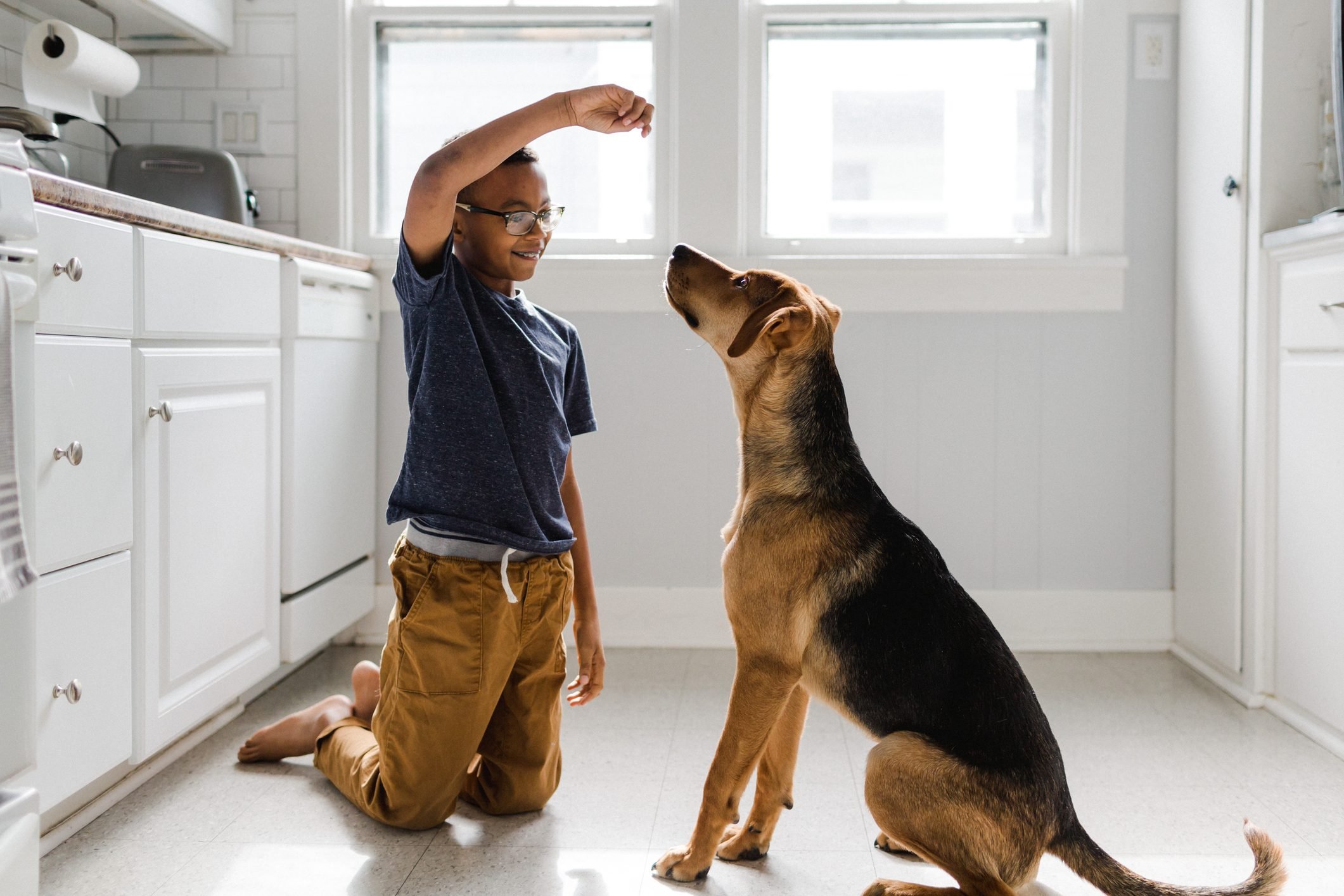Leading Pet Dog Training Techniques for every single Stage of Your Pet Dog's Life
Effective dog training is essential at every phase of a dog's life, as each stage provides unique difficulties and opportunities for growth - Dog Training For Dogs. From the foundational bonding methods required for pups to the tailored strategies required for elderly canines, recognizing these vital periods can substantially boost the human-animal bond. It is essential to recognize that training must evolve along with a pet's advancement, making sure that methods stay pertinent and effective. What certain techniques can be used to resolve the differing needs of your canine as it develops? The solution may amaze you.
Puppy Educating Basics
Puppy training fundamentals lay the groundwork for a well-behaved adult pet and involve several crucial elements that need to not be ignored. The first phase of training concentrates on developing a strong bond in between the puppy and its proprietor, which is critical for effective interaction. Socializing is vital; subjecting pups to various atmospheres, people, and other animals aids them develop confidence and adaptability, reducing the chance of behavior problems later on in life.
Basic commands, such as sit, stay, and come, form the structure of obedience training. Using favorable reinforcement techniques, such as deals with and praise, encourages wanted habits and fosters a favorable knowing experience. Uniformity in commands and training sessions is crucial, as puppies thrive on routine and framework.
Additionally, house training is a crucial element of puppy training. Developing a routine timetable for restroom breaks and making use of designated areas can aid reduce crashes and advertise good behaviors. In general, a well-shaped approach to puppy training, integrating obedience, home, and socializing training, establishes the phase for a well-adjusted grown-up dog, making sure an unified partnership in between the pet and its owner.
Teen Habits Administration
As pups grow into adolescents, their actions can transform considerably, usually offering brand-new challenges for proprietors. This developing phase, typically occurring between 6 months and 2 years, is noted by increased energy levels, curiosity, and a burgeoning feeling of freedom. Understanding these changes is crucial for efficient habits administration.
Teenagers may exhibit rebellious propensities, such as overlooking commands they formerly grasped or participating in destructive actions. Uniformity in training stays critical; reinforcing found out habits through favorable support can help neutralize these obstacles. Short, engaging training sessions are necessary to preserve their interest and emphasis.

Additionally, developing an organized routine can significantly boost a teenage canine's sense of protection. Normal workout is important to direct their power favorably, decreasing the likelihood of unwanted habits. By employing these approaches, owners can effectively browse the complexities of teenage behavior, cultivating a well-adjusted, delighted canine friend.
Adult Pet Dog Obedience Methods

Positive support continues to be a key strategy; gratifying excellent actions with treats, appreciation, or playtime encourages conformity. Uniformity is vital; the very same commands and benefits should be made use of by all family participants to avoid complication.
Incorporating training into day-to-day routines can likewise work. For instance, technique commands during walks or dish times, allowing training to blend flawlessly into daily life. Taking part in structured activities, like agility training courses or obedience courses, can additionally boost a dog's skills while supplying beneficial socialization chances.
It is very important to recognize that adult canines might additionally show stubbornness or complacency. Adjusting training techniques to maintain their rate of interest, such as varying benefits or presenting brand-new commands, can assist receive inspiration. In general, an ongoing dedication to obedience training will cultivate a well-behaved and websites well balanced grown-up canine.
Elderly Canine Adjustment Approaches
Identifying the one-of-a-kind demands of elderly pet dogs is important for ensuring their convenience and well-being. As pets age, they may experience website here a decrease in mobility, vision, and cognitive feature, necessitating tailored adjustment methods.
First, consider modifying the living atmosphere. Guarantee that the home is easily accessible and secure; eliminate challenges and supply non-slip surface areas to avoid drops. Furthermore, consider utilizing steps or ramps to aid them access their favored areas.
Second of all, exercise ought to be readjusted to account for reduced stamina and joint wellness (Dog Training For Dogs). Take part in shorter, much more frequent walks, and include gentle tasks like swimming, which can be beneficial for arthritic joints
Furthermore, mental stimulation remains vital. Use basic challenge toys or engage in scent work to keep their minds sharp, while avoiding overwhelming jobs that might irritate them.
Lastly, regular veterinary check-ups are important to keep track of health and wellness adjustments and readjust treatment routines appropriately. By executing these adjustment approaches, you can boost the top quality of life for your senior canine, ensuring they age gracefully and conveniently.
Lifelong Knowing and Enrichment
While pets of all ages take advantage of finding out and mental excitement, long-lasting enrichment is specifically crucial for keeping cognitive health and wellness and psychological wellness in both senior and younger dogs. Involving tasks not only enhance a pet dog's lifestyle yet also reinforce the bond in between the pet and its proprietor.
Enrichment can take numerous types, consisting of interactive toys, problem feeders, and aroma job, which boost a pet's detects and encourage analytic. Routine training sessions, integrating brand-new commands or methods, maintains their minds sharp and promotes a feeling of success. Socialization with other pet dogs and individuals is just as crucial, as it helps avoid behavioral problems and promotes flexibility.
Moreover, including workout right into a pet dog's regimen is crucial for overall health. Tasks like agility training, bring, or long strolls offer both physical and psychological excitement, making sure pet dogs stay happy and involved.
Finally, take into consideration varying the atmosphere by introducing new areas for playdates or strolls. This adjustment can reignite a pet dog's interest and excitement for expedition. Lifelong discovering click to find out more and enrichment not only add to a fulfilling life but also advertise an unified relationship with your canine buddy.
Final Thought
Efficient canine training techniques advance throughout a pet's life, addressing the special requirements of each developing phase. Highlighting routine psychological excitement, socialization, and physical workout fosters a well balanced and fulfilling life for canines.
Reliable pet training is vital at every stage of a pet's life, as each phase provides unique difficulties and opportunities for growth.Puppy training fundamentals lay the groundwork for a mannerly adult pet dog and entail several vital parts that need to not be forgotten. Generally, an all-round approach to puppy training, integrating socializing, home, and obedience training, sets the stage for a well-adjusted grown-up pet dog, making certain a harmonious relationship between the pet dog and its proprietor.
Numerous pet proprietors may discover that adult pet dogs, while normally even more secure in habits than their adolescent equivalents, still call for consistent training to preserve obedience and great manners.Reliable dog training methods develop throughout a dog's life, dealing with the unique demands of each developing phase.
Comments on “Picking the Right Dog Training For Dogs: Finding the Best Methods for Success”